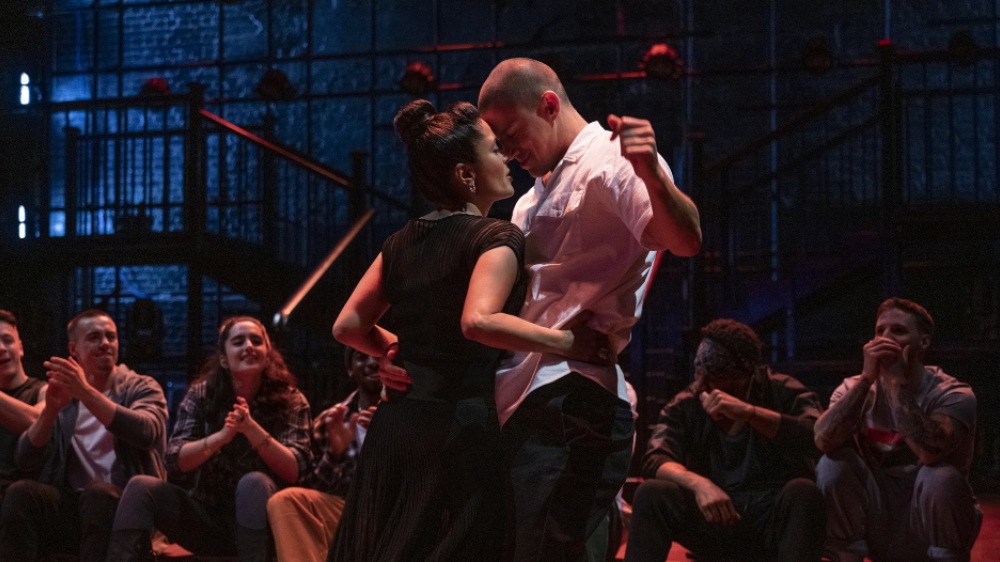Only Steven Soderbergh could make a movie about a bunch of strippers seem poetic, as he did with 2012’s Magic Mike. But, much like his underwhelming sequels to the spectacular Ocean’s Eleven, the third lap dance in his latest franchise, aptly titled Magic Mike’s Last Dance, demonstrates that showbiz persistently ignores at its own peril the old adage that discretion is the better part of valor. Channing Tatum returns as the titular stripper, but this film lacks the compelling originality of the first. It also flounders in the sea of cliches inherent in Hollywood’s recurrent “hooker with the heart of gold” story, even when the tale purports to flip the traditional gender dynamic.
Last Dance finds washed-up dancer Mike Lane (Tatum) down on his luck and bartending — that is, until the mysterious Maxandra Mendoza (Salma Hayek Pinault) walks into his establishment, of all the gin joints in all the towns in South Florida. The story is not exactly Casablanca, though even if it were, you would know that the encounter is all but a coincidence. It soon becomes apparent that the confident, lascivious Maxandra has particular designs in mind for Mike that, although they involve paying him a generous sum, do not require him to sell his physical services or his body. Maxandra wants him, instead, to provide another service — she wants him to choreograph a play that she’s putting on in a London theater.

This premise may be enough to make most moviegoers groan, glaring as it is in its betrayal of the franchise’s founding ideas. The entire point of the original Magic Mike was that there could be dignity in a man selling the fruits of his body to earn a living and that there is no shame — to the contrary, much pleasure — in a woman paying for and enjoying this sort of objectifying entertainment, the shoe on the other foot, for once. Soderbergh, of course, did not just make a movie about strip joints. He made a film that challenged conventional audiences to revisit their own conservative notions of sex work while showing a different side of male dancers and making tough guys like Joe Manganiello come off as surprisingly tender.
But the post-post-modern societies of the 2020s have understandably re-revisited concepts about consent and harassment, necessitating — for better or for worse — neutering old-school versions of sexual enjoyment in the context of potentially exploitative relationships. How quickly things changed for the visionary Soderbergh, whose vision was groundbreaking in 2012 but whose radical notions seem antiquated just a decade later.
Magic Mike’s Last Dance pays a significant price for this castration. Mike is purportedly submitted to the whims of Maxandra, his new employer, who secretly just wants someone to love her. But the script by Reid Carolin is afraid to explicitly express any of this, leaving what could have been explosive chemistry between two modern-day sex symbols rather routine, and dare I say, flaccid. Maxandra wants to put on a play as a form of revenge against her ex-husband, but neither Mike’s flashy moves, the steel abs of his coterie of world-class strippers, nor the irreverent commentary of the show’s female star (Juliette Motamed) is enough to fix what’s broken about this uninspired entry.

The audience is therefore left to hope that the inevitable hip-thrusting, clothes-snatching, and face-humping will provide enough entertainment to leave them satisfied, but when those steamy moments do come, they prove to be too little, too late. There, again, Last Dance is persistently afraid of its own shadow, of tripping over some 2023 wire that accuses the movie, its makers, or its stars of chauvinism, sexism, or some other malapropism (or perhaps worse). Instead of a graceful sweep across a glittery stage, Last Dance and its tentative swagger cause it to stumble and trip, indecision its Achilles heel. Maxandra’s motivations quickly become uninteresting, and the ultimate story arc between her and Mike is obvious from the get-go even as the filmmakers strive to convince you of its sexually liberated and emotionally independent group of characters.
The few moments of Last Dance that do bring pleasure are the work of its vibrant choreography, which thrusts across the stage with confidence even though the audience’s attention will be mostly extinguished by that point. The dancers are talented and aided by rapid editing and flashy cinematography inside the Moulin Rouge-like cabaret in which most of their action takes place. Even here, though, Last Dance simply cannot dance its way out of the shadow of its predecessors, which more aptly leveraged the star power of its well-known strippers to additional comic effect. Here, the guys simply look like a glorified strip show, devoid of the quirkiness of the first two films.
One hopes, then, that Soderbergh meant it when he decided to title this film Last Dance. It is bad enough that we have seen this story many times before, from Pretty Woman and The Wedding Date to so many others featuring both men and women who seek out companionship for hire — with or without sexual intentions. To revisit these tried and true stories and then strip from them the power dynamics that made them pleasurable in the first place is to leave nothing at all for the audience to enjoy or salivate over.
Grade: C+
Magic Mike’s Last Dance is now playing in U.S. theaters courtesy of Warner Bros. Pictures.





